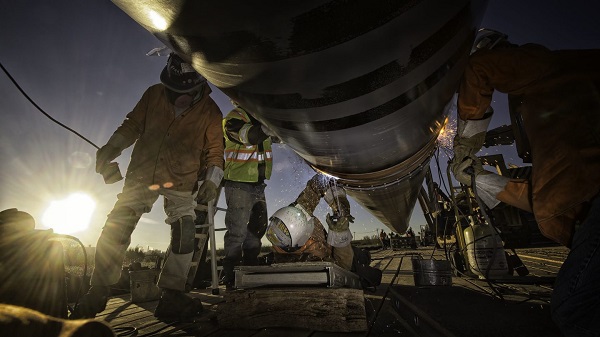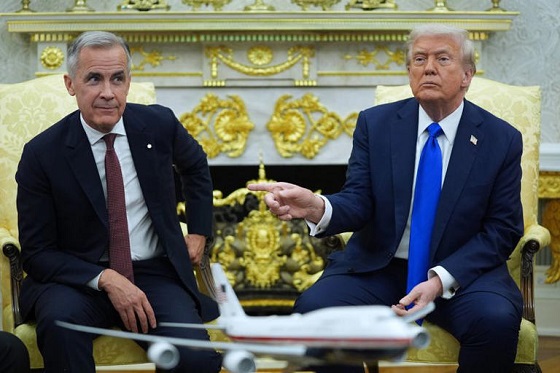Business
Dropping the elbows: Canada caves to Trump’s trade pressure by rolling back retaliatory tariffs

Quick Hit:
Canada is rolling back billions in tariffs on U.S. goods, a sharp reversal by Prime Minister Mark Carney aimed at easing tensions with President Donald Trump as trade talks heat up.
Key Details:
- Canada will eliminate 25% tariffs on U.S. consumer goods worth roughly $21.7 billion, including orange juice, wine, clothing, and motorcycles.
- Prime Minister Carney’s move follows a direct phone call with President Trump and marks a sharp break from his campaign promise to retaliate against U.S. trade measures.
- Canada will maintain tariffs on U.S. steel, aluminum, and automobiles — sectors where Trump has imposed his toughest levies.
Diving Deeper:
Prime Minister Mark Carney is abandoning one of his central campaign promises — to hit the United States with “maximum pain” through sweeping tariffs — and is instead extending what amounts to a trade olive branch to President Donald Trump. The decision to remove 25% tariffs on a broad range of U.S. consumer goods, valued at $21.7 billion, represents a remarkable about-face for a Canadian government that had previously positioned itself as one of Trump’s fiercest international trade adversaries.
The shift follows a phone call between Carney and Trump on Thursday, their first publicly acknowledged conversation in weeks. While Canada will continue to levy tariffs on steel, aluminum, and automobiles, the rollback is a clear sign that Carney is recalibrating his approach in response to U.S. pressure and the looming review of the U.S.-Mexico-Canada Agreement. The White House welcomed the move as “long overdue,” according to a senior official, signaling that Washington sees Ottawa’s retreat as validation of Trump’s hardline negotiating style.
Carney’s pivot is particularly striking given the fiery rhetoric that propelled him into office. During his campaign, he blasted Trump’s tariffs and vowed to retaliate aggressively. That posture may have served him politically against former Conservative leader Pierre Poilievre, but as prime minister, Carney appears more pragmatic. His finance ministry has already carved out exemptions for automakers and other industries since April, suggesting a growing awareness that trade wars can backfire economically.
The decision is also shaped by economic realities. Despite Canada’s earlier tariff blitz, economists note that the effective U.S. tariff rate on Canadian goods remains below 7% thanks to USMCA exemptions. Meanwhile, Canada’s retaliatory tariffs did not produce the inflation surge some feared, with consumer prices rising only 1.7% in July. Still, Carney faced the prospect of prolonged strain with Washington at a time when the U.S. economy is expanding under Trump’s leadership, and Canadian businesses were lobbying hard for relief.
For President Trump, this is another reminder that his “America First” approach is producing results. Canada, once defiant, is now backing down — a stark contrast to the confrontational posture of Justin Trudeau’s government and even Carney’s own campaign pledges. The message is clear: protectionist threats from Washington carry weight, and Canada’s leaders are recognizing that cooperation is more beneficial than confrontation.
The long-term question is whether Carney will maintain this more conciliatory posture or revert to his combative instincts when political pressures mount. For now, though, the rollback underscores Trump’s continued leverage on the global stage and his ability to secure favorable outcomes for American workers and industries.
Business
Government distorts financial picture with definition of capital

“The government is acting fast and loose with the definition of ‘capital. Handing out corporate welfare shouldn’t be considered ‘capital.’
The Canadian Taxpayers Federation is calling on Prime Minister Mark Carney to focus on reducing debt rather than distorting the financial picture by watering down the definition of “capital” spending, as noted by the Parliamentary Budget Officer.
“The PBO shows the government is inappropriately expanding the definition of ‘capital’ spending,” said Franco Terrazzano, CTF Federal Director. “The reality is taxpayers need to cut through Carney’s budget spin and look at one number: How fast is the debt is going up?”
The Carney government announced it’s separating operating and capital spending in its budget. It also released its criteria for what it would consider capital spending.
The PBO’s analysis found that “Finance Canada’s definition and categories expand the scope of capital investment beyond the current treatment of capital spending in the Public Accounts of Canada.”
The PBO added that “based on our initial assessment, we find that the scope is overly expansive and exceeds international practice such as that adopted by the United Kingdom.”
“The government is acting fast and loose with the definition of ‘capital,’” Terrazzano said. “Handing out corporate welfare shouldn’t be considered ‘capital.’
“Regardless of the spending category, more debt means more interest payments and that’s what taxpayers need to focus on to hold the government accountable.”
The PBO’s Economic and Fiscal Outlook projects this year’s “deficit to increase sharply to $68.5 billion.” Debt interest charges will cost taxpayers $55.3 billion this year. That means that paying interest on the federal debt will cost each Canadian about $1,300 this year.
“The government is trying to muddy the water with its accounting nonsense,” Terrazzano said. “The government should stop focusing on cutting the numbers and instead focus on cutting the debt.
“Taxpayers will need to cut through all the accounting noise from the government and focus on one question: Is the debt going up or down?”
Business
Canada Post is failing Canadians—time to privatize it

From the Fraser Institute
By Jake Fuss and Alex Whalen
In the latest chapter of a seemingly never-ending saga, Canada Post workers are on strike again for the second time in less than a year, after the federal government allowed the Crown corporation to close some rural offices and end door-to-door deliveries. These postal strikes are highly disruptive given Canada Post’s near monopoly on letter mail across the country. It’s well past time to privatize the organization.
From 2018 to the mid-point of 2025, Canada Post has lost more than $5.0 billion, and it ran a shortfall of $407 million in the latest quarter alone. Earlier this year, the federal government loaned Canada Post $1.034 billion—a substantial sum of taxpayer money—to help keep the organization afloat.
As a Crown corporation, Canada Post operates at the behest of the federal government and faces little competition in the postal market. Canadians have nowhere to turn if they’re unhappy with service quality, prices or delivery times, particularly when it comes to “snail mail.”
Consequently, given its near-monopoly over the postal market, Canada Post has few incentives to keep costs down or become profitable because the government (i.e. taxpayers) is there to bail it out. The lack of competition also means Canada Post lacks incentives to innovate and improve service quality for customers, and the near-monopoly prohibits other potential service providers from entering the letter-delivery market including in remote areas. It’s clearly a failing business that’s unresponsive to customer needs, lacks creativity and continuously fails to generate profit.
But there’s good news. Companies such as Amazon, UPS, FedEx and others deliver more than two-thirds of parcels in the country. They compete for individuals and businesses on price, service quality and delivery time. There’s simply no justification for allowing Canada Post to monopolize any segment of the market. The government should privatize Canada Post and end its near-monopoly status on letter mail.
What would happen if Ottawa privatized Canada Post?
Well, peer countries including the Netherlands, Austria and Germany privatized their postal services two decades ago. Prices for consumers (adjusted for inflation) fell by 11 per cent in Austria, 15 per cent in the Netherlands and 17 per cent in Germany.
Denmark has taken it a step further and plans to end letter deliveries altogether. The country has seen a steep 90 per cent drop in letter volumes since 2000 due to the rise of global e-commerce and online shopping. In other words, the Danes are adapting to the times rather than continuing to operate an archaic business model.
In light of the latest attempt by the Canadian Union of Postal Workers to shakedown Canadian taxpayers, it’s become crystal clear that Canada Post should leave the stone age and step into the twenty-first century. A privately owned and operated Canada Post could follow in the footsteps of its European counterparts. But the status quo will only lead to further financial ruin, and Canadians will be stuck with the bill.
-

 COVID-192 days ago
COVID-192 days agoFreedom Convoy Sentencing: Lich and Barber escape prison terms but will spend months in house arrest
-

 COVID-1923 hours ago
COVID-1923 hours agoDevastating COVID-19 Vaccine Side Effect Confirmed by New Data: Study
-

 Alberta1 day ago
Alberta1 day ago‘Visionary’ Yellowhead Pipeline poised to launch Alberta into the future
-

 COVID-192 days ago
COVID-192 days agoChris Barber will not see prison time for his role in peaceful Freedom Convoy
-

 Crime2 days ago
Crime2 days agoCanadian Sovereignty at Stake: Stunning Testimony at Security Hearing in Ottawa from Sam Cooper
-

 Alberta1 day ago
Alberta1 day agoSheriffs shut down Olds drug house
-

 Crime2 days ago
Crime2 days agoThe Bureau Exclusive: Chinese–Mexican Syndicate Shipping Methods Exposed — Vancouver as a Global Meth Hub
-

 Business1 day ago
Business1 day agoTrump and Carney full of warm compliments but still no trade deal between Canada and U.S.










